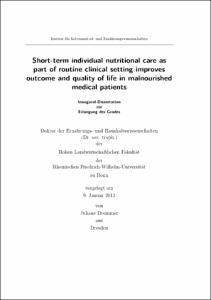Drommer, Juliane: Short-term individual nutritional care as part of routine clinical setting improves outcome and quality of life in malnourished medical patients. - Bonn, 2012. - Dissertation, Rheinische Friedrich-Wilhelms-Universität Bonn.
Online-Ausgabe in bonndoc: https://nbn-resolving.org/urn:nbn:de:hbz:5n-29540
Online-Ausgabe in bonndoc: https://nbn-resolving.org/urn:nbn:de:hbz:5n-29540
@phdthesis{handle:20.500.11811/5122,
urn: https://nbn-resolving.org/urn:nbn:de:hbz:5n-29540,
author = {{Juliane Drommer}},
title = {Short-term individual nutritional care as part of routine clinical setting improves outcome and quality of life in malnourished medical patients},
school = {Rheinische Friedrich-Wilhelms-Universität Bonn},
year = 2012,
month = nov,
note = {Nutritional strategies to treat malnutrition are rare and lack practicability in the hospital setting. This study aims at providing nutritional risk patients with individual nutrition care in order to raise energy and protein intake and investigate nutritional and clinical outcome parameters.
A randomized controlled intervention study was conducted. Risk patients defined by Nutritional Risk Screening 2002 were either randomised to individualised nutritional support (intervention group) or standard hospital care (control group). A tight algorithm was applied to meet daily individual requirements of energy and protein. The nutritional status, body weight and serum vitamin levels were determined. Quality of life was assessed (SF-36 questionnaire) and complications and readmission rates recorded.
The nutritional interventions led to higher intakes (mean (standard deviation)) in energy (1553 (341) kcal vs. 1115 (381) kcal, p<0.001) and protein (65.4 (16.4) g vs. 43.9 (17.2) g, p<0.001). Repeated measure AONVA revealed a highly significant effect on protein and energy intake. Intervention patients kept their body weight in comparison to control patients (0.0 (2.9) kg vs. -1.4 (3.2) kg, p=0.008). Positive effects on serum ascorbic acid level (46.7 (26.7) μmol/l vs. 34.1 (24.2) μmol/l, p=0.010), SF-36 function summary scale (37 (11) % vs. 32 (9) %, p=0.030), number of complications (4/66 vs. 13/66, p=0.035), antibiotics therapy (1/66 vs. 8/66, p=0.033) and readmissions (17/64 vs. 28/61, p=0.027) were recorded. No differences in discharge body weight, length of stay and mortality were found.
Malnourished patients profit in terms of their nutritional status, functionality and quality of life from nutritional support. They gain fewer complications, need fewer antibiotics and are less often rehospitalised.},
url = {https://hdl.handle.net/20.500.11811/5122}
}
urn: https://nbn-resolving.org/urn:nbn:de:hbz:5n-29540,
author = {{Juliane Drommer}},
title = {Short-term individual nutritional care as part of routine clinical setting improves outcome and quality of life in malnourished medical patients},
school = {Rheinische Friedrich-Wilhelms-Universität Bonn},
year = 2012,
month = nov,
note = {Nutritional strategies to treat malnutrition are rare and lack practicability in the hospital setting. This study aims at providing nutritional risk patients with individual nutrition care in order to raise energy and protein intake and investigate nutritional and clinical outcome parameters.
A randomized controlled intervention study was conducted. Risk patients defined by Nutritional Risk Screening 2002 were either randomised to individualised nutritional support (intervention group) or standard hospital care (control group). A tight algorithm was applied to meet daily individual requirements of energy and protein. The nutritional status, body weight and serum vitamin levels were determined. Quality of life was assessed (SF-36 questionnaire) and complications and readmission rates recorded.
The nutritional interventions led to higher intakes (mean (standard deviation)) in energy (1553 (341) kcal vs. 1115 (381) kcal, p<0.001) and protein (65.4 (16.4) g vs. 43.9 (17.2) g, p<0.001). Repeated measure AONVA revealed a highly significant effect on protein and energy intake. Intervention patients kept their body weight in comparison to control patients (0.0 (2.9) kg vs. -1.4 (3.2) kg, p=0.008). Positive effects on serum ascorbic acid level (46.7 (26.7) μmol/l vs. 34.1 (24.2) μmol/l, p=0.010), SF-36 function summary scale (37 (11) % vs. 32 (9) %, p=0.030), number of complications (4/66 vs. 13/66, p=0.035), antibiotics therapy (1/66 vs. 8/66, p=0.033) and readmissions (17/64 vs. 28/61, p=0.027) were recorded. No differences in discharge body weight, length of stay and mortality were found.
Malnourished patients profit in terms of their nutritional status, functionality and quality of life from nutritional support. They gain fewer complications, need fewer antibiotics and are less often rehospitalised.},
url = {https://hdl.handle.net/20.500.11811/5122}
}






